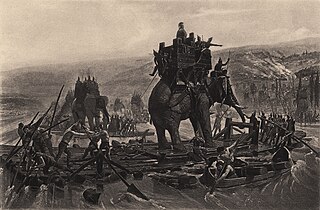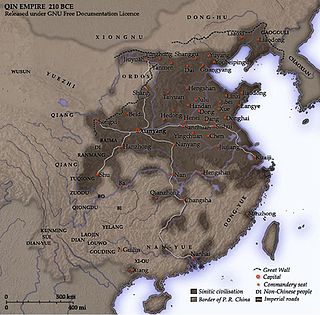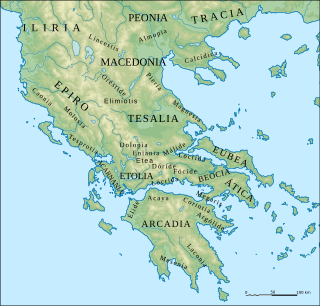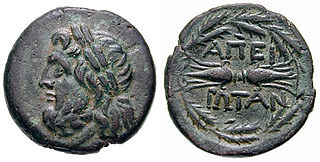Related Research Articles

The Roman calendar was the calendar used by the Roman Kingdom and Roman Republic. Although the term is primarily used for Rome's pre-Julian calendars, it is often used inclusively of the Julian calendar established by the reforms of the Dictator Julius Caesar and Emperor Augustus in the late 1st century BC.

The 3rd century BC started the first day of 300 BC and ended the last day of 201 BC. It is considered part of the Classical Era, epoch, or historical period.
Year 241 BC was a year of the pre-Julian Roman calendar. At the time it was known as the Year of the Consulship of Atticus and Cerco. The denomination 241 BC for this year has been used since the early medieval period, when the Anno Domini calendar era became the prevalent method in Europe for naming years.

This article concerns the 200 BC decade, that lasted from 209 BC to 200 BC.

Epirus is a geographical and historical region in southeastern Europe, now shared between Greece and Albania. It lies between the Pindus Mountains and the Ionian Sea, stretching from the Bay of Vlorë and the Acroceraunian Mountains in the north to the Ambracian Gulf and the ruined Roman city of Nicopolis in the south. It is currently divided between the region of Epirus in northwestern Greece and the counties of Gjirokastër and Vlorë in southern Albania. The largest city in Epirus is Ioannina, seat of the Greek region of Epirus, with Gjirokastër the largest city in the Albanian part of Epirus.

The Qin dynasty was the first dynasty of Imperial China. Named for its origin in the state of Qin, a fief of the confederal Zhou dynasty which had endured for over five centuries—until 221 BC, when it assumed an imperial prerogative following its complete conquest of its rival states, a state of affairs that lasted until its collapse in 206 BC. It was formally established after the conquests in 221 BC, when Ying Zheng, who had become king of the Qin state in 246, declared himself to be "Shi Huangdi", the first emperor.
This article concerns the period 149 BC – 140 BC.

This article concerns the period 309 BC – 300 BC.
This article concerns the period 239 BC – 230 BC.
Year 209 BC was a year of the pre-Julian Roman calendar. At the time it was known as the Year of the Consulship of Verrucosus and Flaccus. The denomination 209 BC for this year has been used since the early medieval period, when the Anno Domini calendar era became the prevalent method in Europe for naming years.
Year 195 BC was a year of the pre-Julian Roman calendar. At the time it was known as the Year of the Consulship of Flaccus and Cato. The denomination 195 BC for this year has been used since the early medieval period, when the Anno Domini calendar era became the prevalent method in Europe for naming years.
Year 229 BC was a year of the pre-Julian Roman calendar. At the time it was known as the Year of the Consulship of Albinus and Centumalus. The denomination 229 BC for this year has been used since the early medieval period when the Anno Domini calendar era became the prevalent method in Europe for naming years.
Year 356 BC was a year of the pre-Julian Roman calendar. At the time, it was known as the Year of the Consulship of Ambustus and Laenas. The denomination 356 BC for this year has been used since the early medieval period, when the Anno Domini calendar era became the prevalent method in Europe for naming years.

Marcus Porcius Cato, also known as Cato the Censor, the Elder and the Wise, was a Roman soldier, senator, and historian known for his conservatism and opposition to Hellenization. He was the first to write history in Latin with his Origines, a now fragmentary work on the history of Rome. His work De agri cultura, a rambling work on agriculture, farming, rituals, and recipes, is the oldest extant prose written in the Latin language. His epithet "Elder" distinguishes him from his great-grandson Cato the Younger, who opposed Julius Caesar.
Year 316 BC was a year of the pre-Julian Roman calendar. At the time, it was known as the Year of the Consulship of Rutilus and Laenas. The denomination 316 BC for this year has been used since the early medieval period, when the Anno Domini calendar era became the prevalent method in Europe for naming years.

Qin Shi Huang was the founder of the Qin dynasty and the first Emperor of China. Rather than maintain the title of "king" borne by the previous Shang and Zhou rulers, he assumed the invented title of "emperor", which would see continuous use by monarchs in China for the next two millennia.

The Molossians were a group of ancient Greek tribes which inhabited the region of Epirus in classical antiquity. Together with the Chaonians and the Thesprotians, they formed the main tribal groupings of the northwestern Greek group. On their northern frontier, they neighbored the Chaonians and on their southern frontier neighbored the kingdom of the Thesprotians. They formed their own state around 370 BC and were part of the League of Epirus. The most famous Molossian ruler was Pyrrhus of Epirus, considered one of the greatest generals of antiquity. The Molossians sided against Rome in the Third Macedonian War and were defeated. Following the war, the region witnessed devastation while a considerable number of Molossians and other Epirotes were enslaved and transported to the Roman Republic, overwhelmingly in the Italian Peninsula itself.

The Thesprotians were an ancient Greek tribe, akin to the Molossians, inhabiting the kingdom of Thesprotis in Epirus. Together with the Molossians and the Chaonians, they formed the main tribes of the northwestern Greek group. On their northeastern frontier, they neighbored the Chaonians and on their northern frontier they neighbored the kingdom of the Molossians. The poet Homer frequently mentions Thesprotia in the Odyssey, which had friendly relations with Ithaca and Doulichi. The Thesprotians originally controlled the Dodona oracle, the oldest religious shrine in Greece. Later, they were part of the Epirus until they were annexed into the Roman Empire.

The Epirote League was an ancient Greek coalition, or koinon, of Epirote tribes.

Epirus was an ancient Greek kingdom, and later republic, located in the geographical region of Epirus, in parts of north-western Greece and southern Albania. Home to the ancient Epirotes, the state was bordered by the Aetolian League to the south, Ancient Thessaly and Ancient Macedonia to the east, and Illyrian tribes to the north. The Greek king Pyrrhus is known to have made Epirus a powerful state in the Greek realm that was comparable to the likes of Ancient Macedonia and Ancient Rome. Pyrrhus' armies also attempted an assault against the state of Ancient Rome during their unsuccessful campaign in what is now modern-day Italy.
References
- ↑ Strabo. Geographica . Vol. x. p. 451. Page numbers refer to those of Isaac Casaubon 's edition.
- ↑ Scullard, Cambridge Ancient History, vol. VII, part 2, pp. 566–568.
- ↑ Bodde, Derk (1987), "The State and Empire of Qin", in Twitchett, Denis; Loewe, Michael (eds.), The Cambridge History of China, vol. I: the Ch'in and Han Empires, 221 BC – AD 220, Cambridge: Cambridge University Press, p. 27, ISBN 0-521-24327-0 .